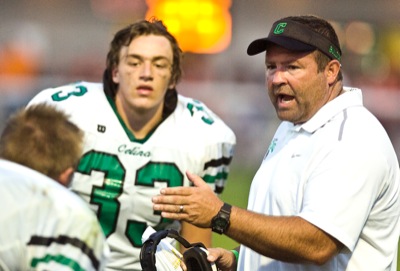Saturday, August 31st, 2013
Classroom optional: Online, virtual schools gaining popularity
Area districts launch own digital classes to keep students, funding
By Amy Kronenberger
Reading, writing and arithmetic remain staples in the American education system, however the standard classroom is becoming optional.
Online classes and virtual academies are gaining in popularity and area districts are working to implement their own digital curriculum to retain students and state funding.
Celina High School this year launched its own virtual academy through TRECA Digital Academy, an Ohio online school. The district lost about 70 students and $400,000 in funding to online schools last year.
Thirty students have re-enrolled into the Celina district because of TRECA; 14 of those students are full-time, according to Celina superintendent Jesse Steiner.
"We had to do something," Steiner said. "When we looked at how much money we were losing, we knew if we could just get some of those kids back it would pay for the program."
TRECA charges the district per class taken; the district will pay less than $10,000 this year, Steiner said. A previously used alternative education software system cost the district $18,000 per year.
TRECA is tuition free for interested students, who receive the same diploma as students in brick and mortar schools upon completion of the program. Steiner said students still pay some standard fees.
Students have the option of taking classes at home or in a school computer lab, where a teacher is available to help if necessary.
Students are asked to be at school at least 30 minutes per day or 2 1/2 hours per week to keep their progress on track. However, officials will compromise if necessary.
"We have a student who's working to make the U.S. Olympic curling team so she travels a lot and can't always make the 2 1/2 hours," he said. "We're willing to work with her on that."
Online classes are taught remotely by teachers hired through TRECA. However, the classes mirror Celina's traditional curriculum.
"The goal is for the student to come back at any time and be able to keep up with the other students," Steiner said.
Students may also use online schools as a way to take one or two classes not otherwise offered by their district.
Fort Recovery Superintendent Shelly Vaughn said online classes were first offered at the district last year to provide more foreign language options to high school students.
"In a small district, we are only able to employ one foreign language teacher," she said. "We wanted to provide our students with options."
With the click of a mouse, Fort Recovery students may choose from Chinese, French, German, Japanese or Latin if they don't want to take traditional Spanish classes.
Fort Recovery implemented the virtual courses through the public online school Connections Learning Academy. Vaughn said she and other school officials chose the program after extensive research.
"The courses are rigorous and student-teacher ratios are small enough to allow for adequate teacher-student interactions," she said.
Vaughn said her district offers a one-to-one program in which all students are provided a laptop. Those taking an online course do so during their study hall using their laptops.
The number of students taking an online course at Fort Recovery has climbed from three last year to six this year, Vaughn said. At Marion Local High School the number climbed from 5 to 25 due to the district offering online German this year. Previously the district only offered advanced placement classes online.
At Minster, students can take online summer school, credit recovery courses and classes for students too ill to attend school through the use of the Auglaize County Education Service Center. The district also requires all seventh- and eighth-graders to take an online foreign language study program.
Superintendent Brenda Boeke said students taking these courses are still enrolled at Minster, but kids wanting to enroll full time in online classes must withdraw from the district. The ESCs in Auglaize and Mercer counties offer full-time online public schools that are not affiliated with a specific district.
St. Henry superintendent Rod Moorman and New Bremen Superintendent Howard Overman said their schools don't offer online alternatives. Moorman, however, has been considering implementing something. He said his teachers are encouraged to use online resources in the classroom.
"We have been talking extensively about online learning," he said. "But we haven't been able to put our arms around just what we would like to do."
Overman said he may be a traditionalist, but he can't see a successful class without a teacher standing in the front of the room as a guide.
"That's not to say it won't change in a year or two though," he said.
New Bremen students have the option of credit recovery or a few other courses through the ESC but nothing through the district.
St. Marys implemented its own online academy a few years ago as a way to recoup lost funding. However, the program was axed as part of the nearly $1.5 million in cuts after the levy failed in May.
High school principal Bill Ruane said the district still offers a few classes through TRECA but only for students with extenuating circumstances.
Parents have many public and private online options if their children struggle in or are unable to attend school in a traditional setting. However, Steiner cautioned parents to do their homework when looking into virtual learning outside their home district.
"Not all of them are created equal, so you have to look into it," he said. "You have to be careful with what you're looking into because not all of them offer the rigor to be successful."
Steiner and the other area school officials also warned that not all students are cut out for virtual learning.
"A lot of high school students are not ready for self-determination and motivation that is necessary to complete the work on their own," Ruane said.
Steiner agreed, saying self-motivation is necessary for a student's online success. Students enrolled totally in online learning also could lose the social interaction that teaches them vital communication skills and working with teachers and peers.
All the educators agreed virtual learning will become a larger presence in the classroom.
"As technology continues to evolve and ... shape our everyday lives, I expect virtual learning to grow," Boeke said. "My hope for the future includes a blended learning approach to allow our students access to the endless possibilities in course offerings but to include a face-to-face component so our students never lose the ability to communicate one-on-one with a fellow human being."



